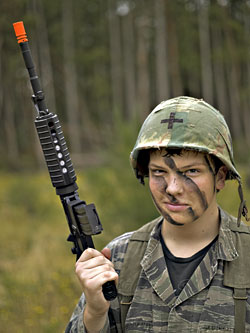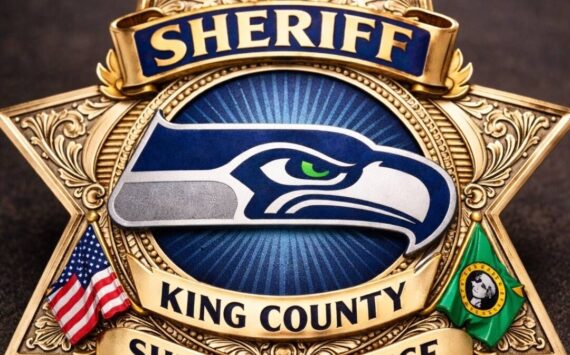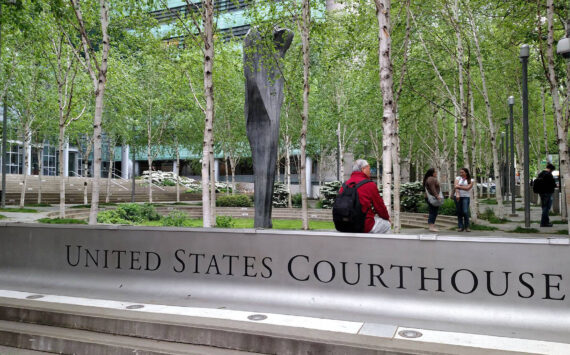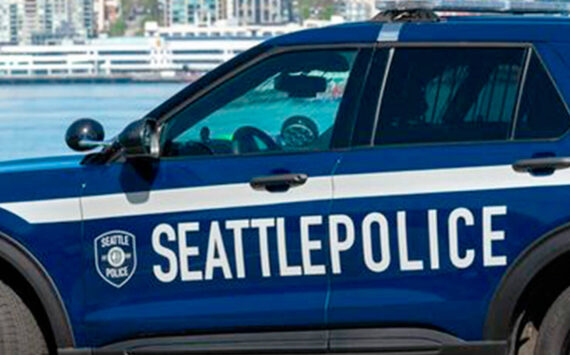U.S. Army Ranger Josh Warren searches the landscape for insurgents. Two of his men have just been hit. They’re lying on the ground, moaning, unable to walk. As a medic tends to one of the wounded, a young soldier not yet out of his teens, Warren leans over to him. “Did you see where they went?” he asks.
“I saw three guys moving on the right,” the young soldier says. “They were carrying AK-47s.”
“That means they’re operating somewhere out there,” Warren notes grimly.
They are indeed, only they’re not the kind of insurgents Warren used to fight during his five tours in Iraq and Afghanistan. They’re Vietcong, or rather people pretending to be Vietcong. Warren, actually no longer a Ranger but a ROTC cadet attending Seattle University, is leading a team of men engaged in a Vietnam War simulation. Some 20 guys—as young as 12 and as old as 42—have come to a thickly wooded, privately owned parcel of land on Fox Island, just west of Gig Harbor, to pretend they’re in the Vietnamese jungle, on a mission to win the hearts and minds of the locals while training them to battle the Vietcong and North Vietnamese. Their weapons: BB guns that look so realistic, even police can’t tell they’re not the real thing.
That resemblance has fueled the popularity of these “Airsoft” guns, a name given them by the Japanese, who first produced them, presumably because the BBs shot by these guns have a relatively soft impact. They’re made of plastic or compressed vegetation, rather than metal, as are traditional BB guns. What Airsoft guns lack in ferocity, they make up for in coolness, as gun lovers see it. They precisely replicate real models, whether current, like the A4 submachine gun used now in Iraq; a historical gun, like the M16 of Vietnam days; or the ever-popular AK-47. So while traditional BB guns were the exclusive domain of kids, grown men take up Airsoft as well, and it’s gaining ground on paintball as the way would-be—and even real—soldiers like to shoot at each other.
Critics attack Airsoft as dangerous, but enthusiasts present it as an activity as wholesome as the Boy Scouts. Either way, it has evolved from a few guys shooting at each other in the woods to, at times, elaborate events that can draw hundreds.
The Fox Island event, put on by a Tacoma company called Battlesim, is small but intense. The guys, who have paid $40 each, show up in Vietnam-era fatigues, “tiger-striped” or monochrome “olive drab,” some with helmets decorated, ’60s style, with peace signs. Among the assembled are Hunger Wilcutt, a 12-year-old whose father is in the National Guard and who finds Airsoft “the closest thing you can get to war”; an Air Force plane electrician named Cameron Shoenberger who sits around a maintenance facility all day and appreciates the chance to be “outside in the dirt”; and Greg Hamilton, a military-history buff who is a sergeant in the National Guard and runs a nationally known firearms school in Bellevue called InSights Training. There also are assorted teens and young men who have no connection to the military.
Then there’s Warren, who helps run these events for Battlesim. A dark-haired, wisecracking 26-year-old, he’s got to be one of the few combat veterans with a theater background: He grew up doing summer stock at a Colorado theater run by his parents. He says he plans these events as he does his plays, asking himself “What’s going to make people step away from their regular life?”
“All right, guys, bring it in!” Warren shouts at the beginning of what is to be a 24-hour event. He’s standing in front of a long tent that’s been set up to look like an Army camp, underneath which the guys have spread their sleeping bags and gear. After explaining the mission, dubbed Operation Somerset Plains after a real mission in Vietnam’s Thua Thien Province, he has them practice military formations and the hand signals for them. With dead-serious expressions, the guys move as a team in a straight line or at a 45-degree angle. “Contact, 12 o’clock, 20 meters,” Warren shouts, as if the enemy were ahead, and they dive into the grass, guns cocked.
Then they head out on “patrol.” They’re ambushed almost immediately, sprayed with BBs by Battlesim employees playing guerrilla soldiers, hiding in the woods. After dealing with the “wounded”—a smoke can sends a plume of orange into the air to tell an imaginary rescue helicopter where to land—Warren’s team continues deeper into the woods.
Eventually they come to a mock Vietnamese hamlet, complete with huts made of Ikea bamboo shades and supposed villagers wandering around in cone hats. “G.I., G.I.,” one exclaims, coming to greet them. Warren calls for a “translator,” who proceeds to speak Vietnamese-sounding gibberish. The putative American soldiers offer “peace beer” (i.e., a can of Budweiser) and medical care while they gather “intelligence.” They stay in character all the while—looking carefully at a villager’s broken leg, taking out an inkpad to get fingerprints, questioning the men under the cone hats about the whereabouts of the Vietcong. They’re all improvising without a script, aside from the rough outline of events that only Battlesim employees know.
After a half-hour or so, they “discover” that one of the villagers is part of the Vietcong. They subdue him with plastic handcuffs and a red bandanna. Still to come: another ambush on the way back to base, a campfire dinner of pho, night patrols, and early-morning raids. Nobody gets much sleep.
One of the villagers is played by Jason Daniel, the 36-year-old founder of Battlesim. Like a large segment of the Airsoft community, Daniel got into the sport through video games, which have brought a new demographic to the gun world. Daniel’s passion was a game called World War II Online, in which players join virtual brigades and conduct virtual missions. Occasionally, players would meet up in the real world. “We’d go to Hooters and drink,” he says, which gave him a better idea: “It’d be really cool to get people together and do something related to World War II.”
Battlesim thus started, six years ago, with World War II simulations. The Vietnam War didn’t immediately strike Daniel as a platform for fun. His dad served three tours in Vietnam. “He never really talked about it, but it was obvious something very bad happened to him,” Daniel says. But he found that the Vietnam War—the war of people’s fathers and uncles—intrigued people. So he began staging a number of events a year, including a “Recondo School,” modeled after special-operations schools during the Vietnam War, that he says draws participants from around the country and abroad.
Daniel, who is of Korean descent and was adopted, says he has no problem playing a Vietnamese villager, although it might seem a bit like a Native American saying “How” and donning feathers for a game of cowboys and Indians. But, aside from noting that “there’s a lot of racism in the Army,” Daniel shies away from the politics of race or the war. “We try to keep out of that.” Instead, he says, the game is about giving people an understanding of war and soldiers while teaching leadership skills and goal planning.
His model student: a 16-year-old named Kyle Olson who shows up at the Fox Island event. The Gig Harbor High School student credits these Airsoft events with being “a life-changer,” something that has not only given him an interest in “Lyndon Johnson’s Pentagon,” but taught him how to take charge among his peers.
R. Jaffe, owner of Sir Plus, a Woodinville Army/Navy surplus store that sells Airsoft guns, notes that quite a number of suburban moms buy guns for their kids. These aren’t the kind of hunting families that traditionally buy guns, he says. “These are people coming out of the video-game world. The common scenario is that the parent comes in with young lad, chagrined that young lad wants to buy a replica assault rifle. The winning argument is: It gets them away from the computer screen. Parents are desperate to get them out in the woods, interacting, running around.”
Senator Frank Lautenberg (D-New Jersey) has a different image of Airsoft guns. Last month he sent a letter to the Consumer Product Safety Commission calling for an investigation into their safety. “Of particular concern is the popularity of these imitation guns among children,” he wrote.
Commission spokesperson Scott Wolfson says the agency is taking the letter seriously but has no comment about a possible investigation. He notes, however, that a Commission survey of hospitals suggests there were 20,000 injuries last year involving either Airsoft or traditional BB guns (the two are not broken out), 11,500 of which involved children. Although Airsoft BBs only cause a minor sting when they hit a clothed part of the body, they can chip a tooth or damage an eye, which is why responsible players encourage everyone to wear goggles or a face mask, something that doesn’t always happen in informal backyard games.
But the bigger concern, as both Wolfson and Lautenberg note, is that police officers may mistake Airsoft guns for the real thing. That happens with all kinds of fake guns. Just weeks ago, Seattle police engaged in a downtown shoot-out with an alleged bank robber carrying a pellet gun, which uses metal projectiles. The suspect, Douglas Michael Cox, took a bullet in the neck. The danger is magnified, however, when guns look as realistic as Airsoft guns do, says David Bishop, police chief of Beaverton, Ore., which last year banned the use of any replica gun in public. “We were having a lot of challenges with kids showing up with [Airsoft] guns in schools,” he explains. “My biggest fear was some police officer being dispatched and having to take a young man’s life, only to find out after the fact that it’s a toy gun.”
Seattle Public Schools spokesperson David Tucker says that Airsoft guns have not been showing up with any frequency here. And neither Seattle Police nor the King County Sheriff’s office seem particularly exercised about the phenomenon, judging by their spokespeople’s reaction. Occasionally, however, a municipality will take a swipe at Airsoft with a state law that prohibits the firing of any “firearm, air gun, or other weapon” in public. Bothell police did so in February to kick a weekly Airsoft game out of some local state-owned woods. Forty-eight-year-old warehouse worker Mark Myers, one of the guys who got the boot, suspects that police got a call from a woman who regularly ran into them while walking her dog, and had a fit every time about the “pollution” of BBs on the land. His team has found a new wooded spot in Woodinville to play.
Things worked out differently when the state Department of Natural Resources last year learned that the area’s biggest group of enthusiasts, a 50-member club called Evergreen Airsoft, was playing on state forest land near Sultan, off Highway 2. “It caused some concern on our part,” says Stan Kurowski, upland business administrator for the DNR’s Northwest region. Mushroom pickers and other members of the public use state forest land, he notes. What would they think if they wandered into the woods and encountered a bunch of guys decked out in camouflage, face masks, and rifles? Possibly that they were terrorists, Kurowski says. So the DNR told the group to stop until it could consider the matter.
One drizzly Saturday last spring, the club put on a demonstration for DNR officials. Kurowski says he found the group “very safety-conscious.” It prohibits shooting people within 20 feet, for instance, and requires players to wear goggles or masks. Ed Chin, a club leader and the owner of a Monroe manufacturing company, says he sees the club’s mission as taking Airsoft out of backyards and into a “safe area.”
So the DNR negotiated a one-year pilot agreement with the club, which allows them to play provided they follow certain safety precautions and use “biodegradable” BBs.
Chin likens Evergreen’s Sunday gatherings to “pick-up games,” unlike Battlesim’s “hard-core” historical simulations. There’s no role playing, no formation drills, no intricate military missions. On a recent sunny Sunday, a few dozen men, most in their 20s and 30s, break up into teams and don blue and red armbands. Then they head for different sides of the woods for the first of several games. The objective is simple: take out as many men on the opposing team as possible. When a player feels the sting of a BB, he shouts “Hit! hit! hit!,” puts a rag over his head, and walks over to the parking area. It’s comical at times. Occasionally, you’ll hear one guy say to another “Are you dead?” or “What team are you on?”
But those in the know employ military strategy. There’s a bunch of veterans among one group of guys who regularly play together as a team. They go by the name of the Rhodesian Raiders, a reference to the white soldiers who fought against the guerrilla movement for black independence in what is now Zimbabwe during the 1960s and ’70s. Matt Deeds, one of the founders, says the name has its origins in a Rhodesian military jacket that he stumbled upon, not the politics of the time. Nonetheless, the Raiders maintain a tribute Web page to real Rhodesian veterans and advertise the fact that a former “Selous Scout” from the Rhodesian Army sometimes plays with the team.
As Deeds observes the first game, he notes that the Raiders have formed an “L” in the woods, which he says is a basic infantry formation that allows the men to squeeze their opponents as they move forward. Not that a novice looking ahead could see anything but trees. “Don’t look for people,” Deeds coaches. “That’s the mistake that everybody makes. You look for movement or odd shapes.”
Deeds should know. He served as a sniper during Desert Storm.
It is curious that soldiers who have shot real weapons in a real war should find any appeal in games with toy guns. If you didn’t know any better, you’d assume Airsoft was the preserve of wannabes, which is exactly the conclusion Rick Weidman, director for policy and government affairs at Vietnam Veterans of America, jumps to when told about the sport. “If you want to do it, join it,” he says, meaning the military. “Don’t do it for the game, do it for the service.” And he adds, as if speaking to Airsoft players and alluding to the wars from Vietnam on: “Where the fuck were you guys when some of our best people were getting killed?”
Over coffee at a Southcenter Starbucks, Deeds, now a clean-cut, 36-year-old trucking-company sales manager who on the side runs adventure-oriented (but non-gun-related) corporate events for a Microsoft contractor, explains how he got involved in the sport, and in the process launched the local Airsoft scene.
While Desert Storm, under Bush Sr., was a low-key affair compared to the current conflicts, Deeds says he saw plenty of fighting, such as at the Battle of Medina, in which the Iraqi Army showed atypical muscle.
“You get this rush” in the military, he says, and when you get out, “you can’t really get it back. I started playing paintball. That didn’t work. It was a bunch of 12-year-olds out there.” Plus, he says, paintball had become too “corporate,” with its own TV shows, uniforms, guns that were no longer called guns but “markers,” and a new label as an “extreme sport.” “They kind of PC’ed the whole thing,” Deeds says.
A friend sent Deeds a Web link about Airsoft, which at the time was huge in Asia but virtually unknown here. “This is frightening,” Deeds says he initially thought, looking at pictures of gun-toting guys in camo and thinking about the “fringe wacko survivalists” who were then running amok in places like Ruby Ridge. “But at the same time,” he thought, “this is intriguing.” He and a handful of guys, most of whom connected through the Internet, sent for Airsoft guns from Hong Kong and met up for the first time on somebody’s property in Graham. Deeds says each was a little worried that the others were psycho, but when that didn’t prove to be the case, they had fun. In short order, friends of friends were playing along, and they had the beginning of what Deeds says is more like a male “support group” than anything else.
Then 9/11 happened. Deeds got the idea to start a company based on Airsoft that would help fill a growing need for more law enforcement training. In 2004, he opened a 30,000-square-foot indoor facility in Kent called Northwest Tactical. At first, it served only law enforcement officers, who practiced their skills with Airsoft weapons. Then it started getting requests from the general public to use the facility, including church youth groups who would say a group prayer before the shooting began. “They wanted to take the kids somewhere organized and controlled,” Deeds says.
Deeds closed the facility two years ago due to financial problems, but he still participates, and he has observed a new crop of players: soldiers returning from Iraq and Afghanistan. Coming from the deadliest conflicts since Vietnam, these soldiers find Airsoft “very, very therapeutic,” Deeds says. “You can go back and redo the situation in your mind, but instead of people getting hurt and injured, everyone at the end of the game stands up and is OK.”
Iraq and Afghanistan vet Josh Warren, who plays with Deeds in the Rhodesian Raiders as well as running Battlesim events, says the sport is a way to share the good parts of the military, “camaraderie and teamwork,” without the bad part, “people actually dying.” While he says he can’t talk too much about his time as a Ranger team leader, which ended in 2004, he notes that Rangers are Special Operations troops who conduct raids “too important, too sensitive, or too rough for the regular Army.” He allows that he participated in rescue missions for Jessica Lynch (though he never personally saw the young soldier captured by Iraqi forces), for a group of Italian soldiers, and for some Saudi truck drivers.
Back home and retired from active duty after eight years of service, Warren says he’s noticed that he’s adjusted better socially since playing Airsoft because he has an outlet to share his war experience with like-minded people. In other settings in which he finds himself in Seattle, revealing yourself to be a veteran of Bush Jr.’s war can bring conversation to a halt. Case in point: At a dinner party not long ago he launched into an anecdote about his time in Afghanistan. The story was meant to illustrate how Afghanis use “food and tea to welcome people, whether they like you or not.” But the narrative broke down as soon as Warren said he was “on a mission.”
“What does that mean, ‘on a mission?'” someone asked.
“It’s almost like being a porn star,” Warren reflects as he recalls that dinner. “You can only use euphemisms for so long before you have to say, ‘Well, I was killing people.'”
Airsoft’s military bona fides are shored up by the presence of “military celebrities,” as they are known, at large-scale events put on in southern California by a Los Angeles businessman named John Lu. The Taiwanese-born Lu more often deals with regular Hollywood stars, arranging private meetings for his Asian clients, who sometimes pay in the six figures. Six years ago, he says, on a dare from some friends in the Airsoft business, he called up retired Col. Danny McKnight and asked him to take part in an Airsoft event. McKnight famously led a perilous mission in Somalia that was immortalized by the movie Black Hawk Down.
McKnight accepted. So began the first of an annual event known as “Lionclaws,” which Lu bills as the “Super Bowl” of Airsoft and draws up to 700 people. McKnight is joined at such events by, among others, Vietnam War veteran and historian Kenn Miller and Howard “Mad Max” Mullen, a former Ranger so renowned that he has a toy soldier named after him. Rather than reliving old wars, they lead mock military missions set in a present-day anywhere.
Some people get carried away with the game, Lu admits. Players with no military experience have been known to post their Airsoft exploits on Web sites for real soldiers, who react with disdain. Lu says one Airsoft player was even charged with “stolen valor” for impersonating an officer online. “Don’t cross the line,” Lu warns.
Yet soldiers and wannabes seem to play Airsoft alongside each other just fine. The soldiers have their memories, the wannabes have their fantasies. They meet somewhere in between, many acknowledging that what they’re doing looks, if not scary, then a little silly. They’re OK with that. Bert Cho, a 45-year-old systems administrator from Mill Creek who is fascinated by the military but never joined, laughingly quotes his 13- and 10-year-old daughters’ view of his Sunday habit. “They say I play dress-up.”








